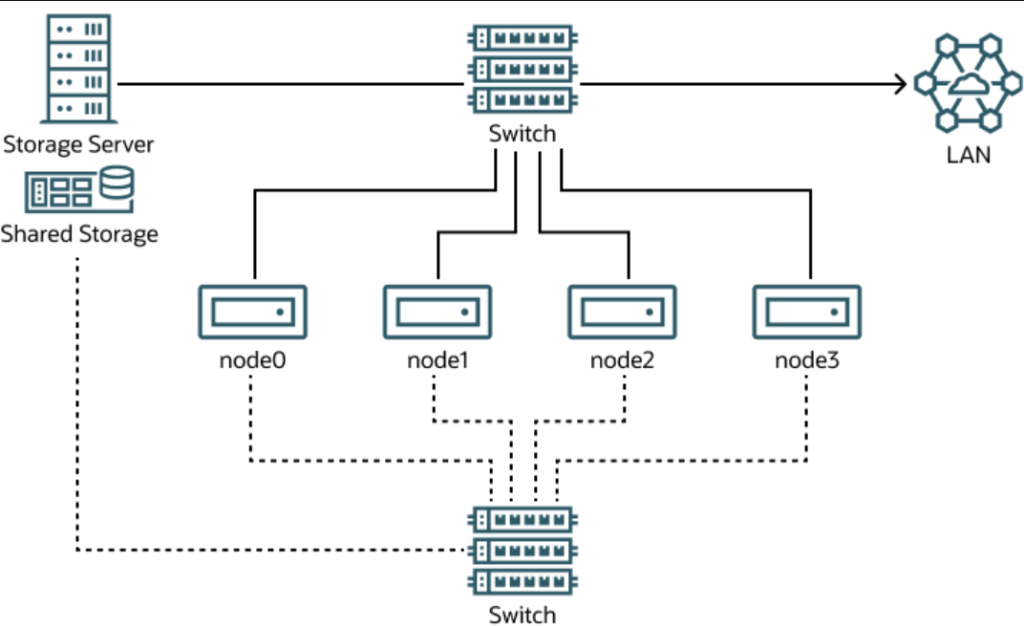
OCFS2 stands for Oracle Cluster File System version 2, which is an open-source, POSIX-compliant disk-based file system developed by Oracle Corporation. It was designed to be used with Linux-based systems. The key feature of OCFS2 is its ability to be accessed concurrently from multiple nodes in a cluster, making it particularly useful for shared-disk, high-availability applications, and for use with Oracle RAC (Real Application Clusters).

OCFS2 supports features such as:

OCFS2 Troubleshooting Guide
Troubleshooting issues with OCFS2 can involve various steps depending on the specific problem you’re encountering. Here’s a structured approach to help you identify and address common issues:
1. Gather information:
- Distribution and version: Knowing your operating system (e.g., RHEL, SUSE) and version helps identify appropriate troubleshooting steps and potential distribution-specific quirks.
- Cluster setup: Is this a single-node or clustered setup? Clustered setups involve additional configuration checks.
- Error messages: Any relevant error messages from system logs (
/var/log/messagesand/var/log/dmesg) can provide valuable clues about the issue. - Specific problem: Describe the exact behavior you’re observing (e.g., not mounting after reboot, I/O errors).
2. Initial checks:
- Network connectivity (if applicable): If the OCFS2 volume resides on shared storage, verify network connectivity between nodes and ensure firewalls aren’t blocking necessary ports.
- o2cb service (if applicable): In some setups, the
o2cbservice manages the OCFS2 cluster. Check if it’s running and enabled using commands likesystemctl status o2cbandsystemctl enable o2cb.
3. fstab entry:
- Ensure the fstab entry for the OCFS2 filesystem is correct. It should include:
- Device name (e.g.,
/dev/sdb) - Mount point (e.g.,
/var/www) - Filesystem type (
ocfs2) - Appropriate options:
_netdev: Used for network-based mounts, ensures the network is up before attempting to mount.
- Device name (e.g.,
4. Common troubleshooting steps:
- Manually mount the filesystem: Try mounting the filesystem manually using the
mount.ocfs2command. This can help identify permission or configuration issues preventing automatic mounting. - Check permissions: Verify that the user or group mounting the filesystem has the necessary permissions to access the mount point directory.
- Verify disk space: Ensure sufficient free space is available on the OCFS2 volume.
- Review logs: System logs (
/var/log/messagesand/var/log/dmesg) might provide additional clues about the issue. Look for errors related to OCFS2 or the specific device.
5. Advanced troubleshooting (if necessary):
- Use
fsck.ocfs2: This utility can check and potentially repair file system errors, but use it with caution and back up your data beforehand (refer to the documentation for specific options and usage). - Cluster configuration (if applicable): In clustered setups, review configuration files (e.g.,
/etc/ocfs2/cluster.conf) and ensure consistency across all nodes. - Consult distribution documentation or community forums: Refer to your specific OS and OCFS2 version documentation for detailed troubleshooting steps and known issues. Additionally, community forums can provide insights from other users who might have encountered similar problems.
List of all commands to work with OCFS2
Here’s a list of some common commands used to work with OCFS2:
Basic management:
- mkfs.ocfs2: Formats a partition or device for use with OCFS2.
- mount.ocfs2: Mounts an OCFS2 filesystem.
- umount.ocfs2: Unmounts an OCFS2 filesystem.
- fsck.ocfs2: Checks and potentially repairs an OCFS2 filesystem.
Advanced management:
- tunefs.ocfs2: Changes various options and parameters of an OCFS2 filesystem.
- ocfs2_info: Displays information about an OCFS2 filesystem.
- ocfs2_clrchk: Checks and clears cluster configuration information.
- o2cb (cluster only): Manages the OCFS2 cluster communication layer.
Informational:
- ocfs2_lsclusters (cluster only): Lists available OCFS2 clusters.
- ocfs2_showconfig (cluster only): Displays the current OCFS2 cluster configuration.
- ocfs2_controldump (cluster only): Dumps information from the OCFS2 cluster control daemon.
Debugging:
- debugfs.ocfs2: A debugging tool for examining internal OCFS2 data structures.
1. o2cb
- Service Management: Manages the O2CB cluster service, which is crucial for OCFS2 operation.
- Start the service:
service o2cb start - Stop the service:
service o2cb stop - Check the status:
service o2cb status - Enable on boot:
chkconfig o2cb on(SysVinit) orsystemctl enable o2cb.service(systemd)
- Start the service:
2. tunefs.ocfs2
- Tune File System Parameters: Used to adjust various file system parameters on OCFS2 volumes.
- Example:
tunefs.ocfs2 -L "NewLabel" /dev/sdb1changes the volume label.
- Example:
3. mkfs.ocfs2
- Create File System: Used to format a disk partition as an OCFS2 file system.
- Example:
mkfs.ocfs2 -L "VolumeLabel" /dev/sdb1
- Example:
4. fsck.ocfs2
- File System Check: Checks and optionally repairs an OCFS2 file system.
- Example:
fsck.ocfs2 -fy /dev/sdb1
- Example:
5. mounted.ocfs2
- List Mounted Volumes: Lists all OCFS2 volumes currently mounted on the system.
- Example:
mounted.ocfs2
- Example:
6. o2info
- Cluster Information: Displays information about the cluster configuration and status.
- Example:
o2info --status
- Example:
7. mount and umount
- Mounting/Unmounting File Systems: Standard Linux commands used to mount and unmount OCFS2 file systems, with options specific to cluster file systems.
- Mount:
mount -t ocfs2 /dev/sdb1 /mnt/point - Unmount:
umount /mnt/point
- Mount:
8. debugfs.ocfs2
- Debugging Tool: Provides a means to examine and debug an OCFS2 file system.
- Example:
debugfs.ocfs2 /dev/sdb1
- Example:
Additional Tools and Files:
- /etc/ocfs2/cluster.conf: The main configuration file for OCFS2 clusters. This file defines nodes, cluster name, and other important settings.
- /etc/init.d/o2cb: The init script for managing the O2CB cluster stack on systems using SysVinit.
- systemctl [start|stop|status] o2cb: Commands to manage the O2CB service on systems using systemd.
Notes:
- OCFS2 Console (ocfs2console): In some distributions, an OCFS2 management GUI called
ocfs2consoleis available. This tool provides a graphical interface to configure and manage OCFS2 clusters, but it may not be included in all Linux distributions. - Cluster Management: Managing an OCFS2 cluster often involves more than just handling the file system. It might require managing network configurations, coordinating with cluster management tools (like Pacemaker or Corosync), and ensuring that all nodes maintain consistent configurations and time synchronization.
- What is Mobile Virtual Network Operator? - April 18, 2024
- What is Solr? - April 17, 2024
- Difference between UBUNTU and UBUNTU PRO - April 17, 2024

